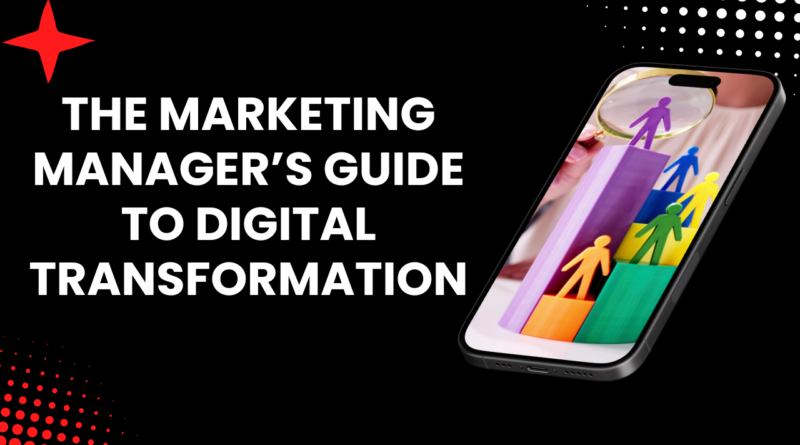The Marketing Manager’s Guide to Digital Transformation
Businesses must embrace digital transformation in the fast-paced, technologically-driven world of today. For marketing managers, staying ahead in the digital landscape is critical to success. The role of a marketing manager has evolved significantly over the years, moving from traditional campaign management to becoming a key player in driving digital innovation and business growth.
This guide explores how marketing managers can navigate and lead successful digital transformation initiatives within their organizations.
1. Understanding Digital Transformation
Digital transformation refers to the integration of digital technologies into all areas of a business, fundamentally changing how a company operates and delivers value to its customers. For marketing, it means adopting new tools, platforms, and strategies to engage audiences in more dynamic and personalized ways.
Marketing managers are at the forefront of this transformation. They must blend data analytics, automation, customer relationship management (CRM) systems, and advanced marketing technologies (MarTech) to create a cohesive digital strategy that aligns with business goals.

2. Why Digital Transformation Matters to Marketing Managers
2.1. Shifting Customer Expectations
Consumers today expect more personalized, seamless, and relevant experiences across all channels. Whether through social media, email marketing, or digital ads, they expect businesses to anticipate their needs and provide tailored solutions. Marketing managers must adopt digital tools that track customer behavior and preferences to deliver these highly personalized experiences.
2.2. Competition in the Digital Age
In a world where competitors can spring up overnight with a strong digital presence, it’s essential for businesses to stay competitive. Digital transformation allows marketing teams to be more agile, enabling rapid campaign development, testing, and optimization. Marketing managers can leverage AI-powered tools, real-time analytics, and automation to respond to market changes faster than ever before.
2.3. Data-Driven Decision Making
Gone are the days when marketing decisions were based purely on intuition. With digital transformation, marketing managers have access to vast amounts of data, from customer behavior analytics to campaign performance metrics. These insights allow for more informed decisions, helping optimize marketing spend, improve customer targeting, and enhance overall campaign effectiveness.
3. Key Steps in Leading Digital Transformation as a Marketing Manager
3.1. Building a Digital-First Mindset
The first step in digital transformation is fostering a digital-first culture within your team and the broader organization. Marketing managers should educate team members about the benefits of digital tools and the need for agility in today’s marketplace. This involves not just implementing new technology, but also encouraging a mindset of continuous learning and adaptation.
3.2. Investing in the Right Tools and Technology
Digital transformation is heavily reliant on the right mix of technology. Marketing managers must be able to evaluate and implement tools that drive automation, streamline workflows, and deliver actionable insights. Some of the key technologies include:
- Customer Relationship Management (CRM) Systems: To better track and engage customers across their entire journey.
- Marketing Automation Platforms: To automate repetitive tasks like email marketing, social media scheduling, and lead nurturing.
- Data Analytics Tools: To provide insights into customer behavior and campaign performance.
- Content Management Systems (CMS): To streamline content creation and distribution across various digital channels.
Selecting the right tools that align with your business goals and budget is critical for driving efficiency and scalability in your marketing efforts.
3.3. Leveraging Data for Personalization
One of the main benefits of digital transformation is the ability to offer personalized experiences at scale. Marketing managers can use data analytics and AI-powered tools to segment their audiences more effectively, delivering customized content and offers that resonate with specific customer needs.
For example, personalization can include dynamic website content that changes based on a user’s previous interactions, targeted email marketing that addresses specific interests, or tailored product recommendations based on browsing history.
3.4. Integrating Omni-Channel Marketing Strategies
Digital transformation empowers marketing managers to create seamless customer experiences across multiple channels, whether that’s online, in-store, or on mobile devices. This is known as omni-channel marketing. By leveraging digital tools, managers can ensure consistency in branding, messaging, and customer experience across platforms like social media, email, websites, and physical stores.
An effective omni-channel strategy creates a unified experience for customers, improving brand loyalty and increasing the likelihood of conversions.
3.5. Continuous Learning and Adaptation
The digital landscape is constantly evolving, and marketing managers must stay informed about emerging trends, tools, and technologies. From AI and machine learning to augmented reality (AR) and voice search, the future holds many possibilities for innovation. Marketing managers need to foster a culture of continuous learning within their teams, ensuring they remain competitive and agile.
Marketing professionals should regularly engage in industry conferences, webinars, and training programs to keep their skills sharp. Staying updated on best practices ensures that marketing efforts stay relevant and effective.
4. Overcoming Challenges in Digital Transformation
4.1. Resistance to Change
One of the biggest barriers to digital transformation is resistance from within the organization. Employees may be hesitant to adopt new technologies or fear job displacement due to automation. Marketing managers must act as change champions, demonstrating the long-term benefits of digital transformation and addressing concerns early on.
By involving team members in the decision-making process and providing comprehensive training, marketing managers can reduce resistance and promote buy-in.
4.2. Data Privacy and Security
With digital transformation comes the responsibility to protect customer data. As more personal information is collected, marketing managers must ensure compliance with regulations like the General Data Protection Regulation (GDPR) and the California Consumer Privacy Act (CCPA). Implementing strong data protection measures and transparent policies is crucial to building trust with customers.
4.3. Managing Technology Overload
With so many tools and platforms available, marketing managers can easily become overwhelmed by options. Choosing the right MarTech stack that complements your strategy is critical. Avoid the temptation to invest in every new tool—focus on those that deliver real value and solve specific business problems.
5. Measuring Success in Digital Transformation
A successful digital transformation is not a one-time project but an ongoing journey. To measure its effectiveness, marketing managers must set clear goals and KPIs from the outset. These can include metrics like:
- Increased lead generation
- Higher customer retention rates
- Improved ROI on marketing spend
- Enhanced customer satisfaction scores
- Shorter sales cycles
By regularly reviewing and adjusting your digital strategy based on these KPIs, marketing managers can ensure long-term success.
Digital transformation presents marketing managers with an unprecedented opportunity to innovate and drive growth. By embracing digital tools, fostering a data-driven mindset, and staying adaptable, marketing managers can lead their teams to thrive in the digital age. While challenges like resistance to change and data privacy must be navigated carefully, the rewards of a successful digital transformation can be substantial—leading to improved customer experiences, greater efficiency, and increased competitive advantage.
The key takeaway for marketing managers is that digital transformation is not just about technology; it’s about rethinking how marketing can deliver value in a fast-changing world. With the right strategy, tools, and mindset, marketing managers can position their organizations for success in the digital future.
